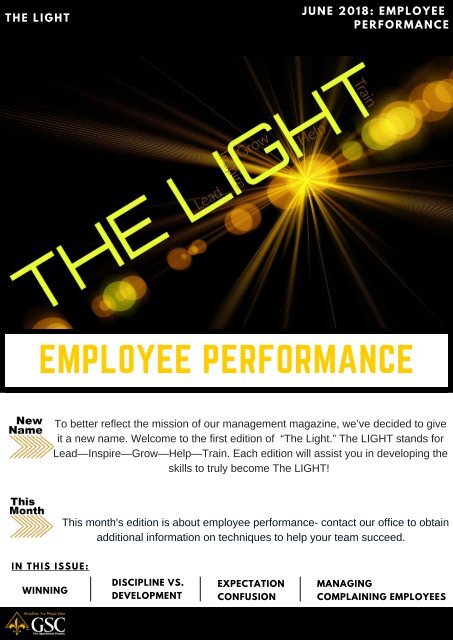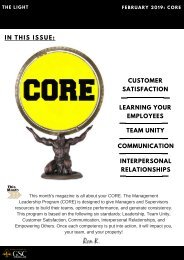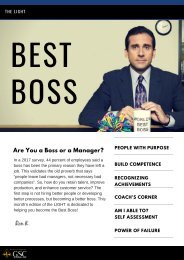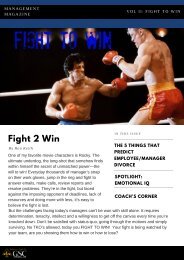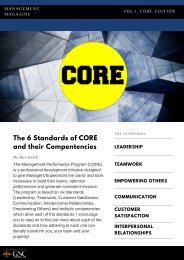Employee Performance
June 2018
June 2018
Create successful ePaper yourself
Turn your PDF publications into a flip-book with our unique Google optimized e-Paper software.
T H E L I G H T<br />
J U N E 2 0 1 8 : E M P L O Y E E<br />
P E R F O R M A N C E<br />
EMPLOYEE PERFORMANCE<br />
To better reflect the mission of our management magazine, we’ve decided to give<br />
it a new name. Welcome to the first edition of “The Light.” The LIGHT stands for<br />
Lead—Inspire—Grow—Help—Train. Each edition will assist you in developing the<br />
skills to truly become The LIGHT!<br />
This month's edition is about employee performance- contact our office to obtain<br />
additional information on techniques to help your team succeed.<br />
I N T H I S I S S U E :<br />
WINNING<br />
|<br />
DISCIPLINE VS.<br />
|<br />
EXPECTATION<br />
|<br />
DEVELOPMENT CONFUSION<br />
MANAGING<br />
COMPLAINING EMPLOYEES
Forward by Ron Keith, Training Director<br />
In a recent Scientific American article, Dr. Amanda Baker wrote that: “Winning is about showing team members<br />
how to think of themselves as part of a unit, deal constructively with setbacks, and value the good of the group in<br />
the long term over personal feelings in the moment.” Winning requires collaboration, in my office I have a sign that<br />
reads “Trust + Unity = Winning.” It clarifies for me the type of relationship I must maintain with my team in order to<br />
win each day. As Dr. Baker points out many people place their preferences, problems and pride above the<br />
success of the team. This produces barriers to achieving goals.<br />
Does your team have the DNA of a winner? Below are my top 5 characteristics of winning teams:<br />
• Process For Handling Conflict—If you want success expect a house call from conflict. Winning teams have<br />
processes for handling adversity. They don’t allow conflict to detour, distract or diminish their focus.<br />
• Have A Shared Vision—When teams don’t share vision, they won’t share in victory. Vision is the glue that<br />
bonds accountability and effort. Without vision you may see small successes, but never true victories.<br />
• Communicate With Respect—Do members respect the right of each individual to have an opinion different<br />
from their own? Winning teams don’t allow a difference of opinion to create dislike for the individual. Winners are<br />
also willing vessels for feedback.<br />
• Adversity Doesn’t Eclipse Success—When trouble comes, winning teams don’t throw in the towel.<br />
Adversity will come, but its shadow should never be seen as permanent. Winners preserver and overcome.<br />
• Competent In Their Role—Teams win when each member masters their role, and understands their<br />
assignment is part of a larger collective. They understand an individual win is not greater than a collective loss.
Discipline vs. Development<br />
The discipline approach is based upon the fallacy that<br />
people will respond progressively better when treated<br />
progressively worse. Discipline typically produces<br />
feelings of rejection, frustration, and humiliation. Rather<br />
than motivating employees to become better<br />
performers, it’s more likely to teach them that they<br />
should merely avoid getting caught.<br />
Development on the other hand is about refining skills,<br />
understand expectations, solving problems, achieving<br />
desired levels of performance, and getting results.<br />
Development produces sustainable positive outcomes.<br />
It positions your team to do the right thing, at the right<br />
time, each and every time. When done correctly<br />
development conveys to the employee that their success<br />
is linked to the success of the team.<br />
Discipline is an action that the person with authority<br />
takes against employees for misbehavior.<br />
Development is a process to help people make good<br />
choices about working together in a safe, ethical and<br />
productive way.<br />
Essential to development is feedback. There are two types:<br />
1. Reinforcing Feedback—tells you what you are doing well<br />
and what you need to continue to do.<br />
2. Redirecting Feedback—reveals behaviors that need to<br />
change or areas where you need more development.<br />
Each type has its place in a development conversation, but Reinforcing Feedback is almost always more<br />
readily and accurately received by the recipient. Redirecting Feedback, by contrast, often meets<br />
resistance. It is more likely to be accepted under these very specific conditions:<br />
It comes from a credible source<br />
It’s objective rather than subjective<br />
It’s supported by hard data and specific examples<br />
It concerns behaviors that are controllable by the recipient<br />
• It is descriptive rather than judgment<br />
• It focuses on impact rather than intent<br />
• It is specific rather than vague<br />
• It’s job related
Leadership<br />
vision,<br />
is when your<br />
The highest levels of<br />
performance come to<br />
people who are centered,<br />
behaviors<br />
and intuitive, creative, and<br />
reflective - people who<br />
synchronize<br />
know to see a problem as<br />
to inspire an opportunity."<br />
others to unite.<br />
- Deepak Chopra
Expectation Confusion<br />
Having clarity on expectations is<br />
essential to aligning behaviors to<br />
performance standards. When deciding<br />
on how to address performance<br />
issues, be sure the following<br />
conditions are in place by asking<br />
yourself these questions:<br />
1. Did the employee clearly understand the rule or policy that was violated?<br />
Were the rules or policy provided to the employee prior to the violation? It is management’s responsibility to ensur<br />
the employee knows the rules or policies.<br />
2. Was the rule or policy consistently and fairly enforced by management?<br />
Does management have a history of ignoring or being selective in following policy? You can’t hold someone<br />
accountable to inconsistency.<br />
3. Did you consider the previous good (or bad) work record of the employee?<br />
One mistake should not define an employee’s net worth. Kobe Bryant missed more shots than any other player in<br />
NBA history; yet he is considered one of the greatest to ever play the game.<br />
4. Did the employee know that violating the rule or policy could lead to a performance problem?<br />
Seems almost obvious, but when consequences are unknown, behavior is unpredictable.<br />
Managing Complaining <strong>Employee</strong>s<br />
Here are a few tips on how to manage and communicate with complainers.<br />
Listen: Listening shows you value the individual. Clarify the complaining isn’t<br />
frustration or venting. Listen for why they are complaining vs. what they are<br />
complaining about.<br />
Defuse: Put out the fire. Don’t allow complaining to turn into anger. Take contr<br />
of the situation, and demand professionalism.<br />
Avoid Judgmental Feedback: Harsh feedback can be an obstruction to future<br />
communication. A key to having a successful team is maintaining free and open<br />
dialogue.<br />
Redirect: Challenge them to solve the problem. Direct them out of emotion and<br />
into resolution. Help them to focus on the aspects they have control over.<br />
Discuss What’s Right: Hear the complaint, but then ask the individual to<br />
discuss what’s going right. When the focus is on the 5% bad people forget abou<br />
the 95% good.
Coach's Corner<br />
Further Reading available through<br />
the GSC Training Department!<br />
Our book of the month is Thank God It’s Monday: How to Create a Workplace You<br />
and Your Customers Love. In this book, Cathy Proviano and the HRDQ Development<br />
Team provide valuable insight for jump-starting positive change from anywhere in your<br />
department. To be successful, you need to have a workplace that people enjoy,<br />
including your customers. Request your copy from the Training Department today.
Follow us on Instagram<br />
@GSCTrainingDept!<br />
Have a request you'd like to see<br />
featured? Reach out to us at<br />
jfreeman@gscapts.com.<br />
What is the best way you've<br />
found to improve <strong>Employee</strong><br />
<strong>Performance</strong> on your team?<br />
WE WANT YOUR<br />
FEEDBACK!<br />
Share your thoughts with us!


